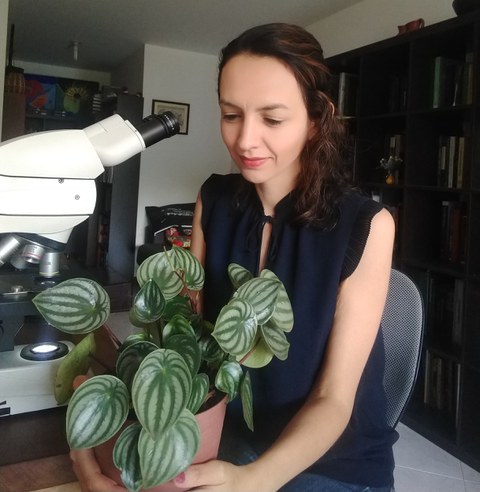10th anniversary of the TU Dresden Fellowship Program: Dr. Natalia Pabón-Mora
In 2023 we are celebrating the 10th anniversary of the TU Dresden Fellowship Program. In ten years, more than 200 most qualified researchers from all over the world have become TU Dresden Fellows. The variety of research areas and countries are as diverse as each guest stay itself and TU Dresden as a whole.
This year, we are featuring former TU Dresden Fellows and their experiences during their time in Dresden and at our university. We hope that by telling these success stories, we can inspire other international scholars to come to Dresden and thus further promote international cooperation in research and teaching at TU Dresden.
Interview with with Dr. Natalia Pabón-Mora, TUD Junior Fellow 2019
What motivated you to participate in the TUD Fellowship program?
The Biology department at TUD has a really strong research program in plant systematics and structural biology, that in connection with the outstanding living collections at the Dresden Botanical Garden were extremely attractive to advance my own research program. The resources are fabulous and the staff are just incredibly supportive of collaborative research. I could have not asked for a better match in terms of academic interests and I am very grateful to this day of having received the TUD Fellowship.
Thinking back to your time in Dresden: What are your personal highlights of the experience?
The atmosphere of the city is really unique, it is such a special place with a mix of ancient and modern, classic and fresh eclectic, with a vibrant culture of its own. The University itself offers a special ambient, again having a deep rooted essence in grounded classical structural botany with marvelous living collections, yet modern and state of the art technologies to study plant evolution and development. I reinforced my relationships with colleagues, was able to learn from their culture, and made new friends many of which I still have contact with today.
How did the TU Dresden Fellowship help you to improve your academic development?
From the experience I was able to publish one of the most important articles from my career. There we describe what makes dutchman´s pipe flowers so especial. The paper is: Pabón-Mora N., Madrigal Y., Alzate J.F., Ambrose B.A., Ferrándiz C., Wanke S., Neinhuis C., Gonzalez F. 2020. Evolution of Class II TCP genes in perianth-bearing Piperales and their contribution to the bilateral calyx in Aristolochia. New Phytologist. 228: 752-769. https://nph.onlinelibrary.wiley.com/doi/10.1111/nph.16719.
The manuscript has allowed me to get new projects and grants linked to the evolution of unique floral forms. I am happy to report that interest has grown and many peers want to collaborate on interesting aspects of floral form and floral evolution until this day.
How would you describe your relationship with the TU Dresden today?
Active, with many shared research questions, and numerous manuscripts still being written as a result of my visit 4 years ago
If you could talk to a Fellow who just arrived in Dresden, what would you recommend him or her?
Make space for life in Dresden. Sure, do your academic things first but make sure there is room to learn about the culture, the people, the manners, the ways of living, the art, the music and the food. There are so many things to explore that you wont be bored a single day!What do you think are the three most important developments in your field of science during the last decade?
Plant developmental biology is an ongoing growing discipline, every month numerous updates in the field include the identification of responsible genes of different plant features. In the last 10 years researchers have found out what are the most important genes controlling bilateral floral symmetry, spur development, fruit patterning, inflorescence forms, rosette growth, reshaping of leaves, etc… We have witnessed a growing interest in the genetic control of plant patterning, adaptation and diversification. In that context we have contributed in understanding the genes controlling floral shape and genes retained in holoparasitic plants which are those lacking leaves but having normal flowers and fruits , parasitizing other autotrophic plants.
______________________________________________________________________________________________
You can find more information about the TU Dresden Fellowship and other alumni here.

